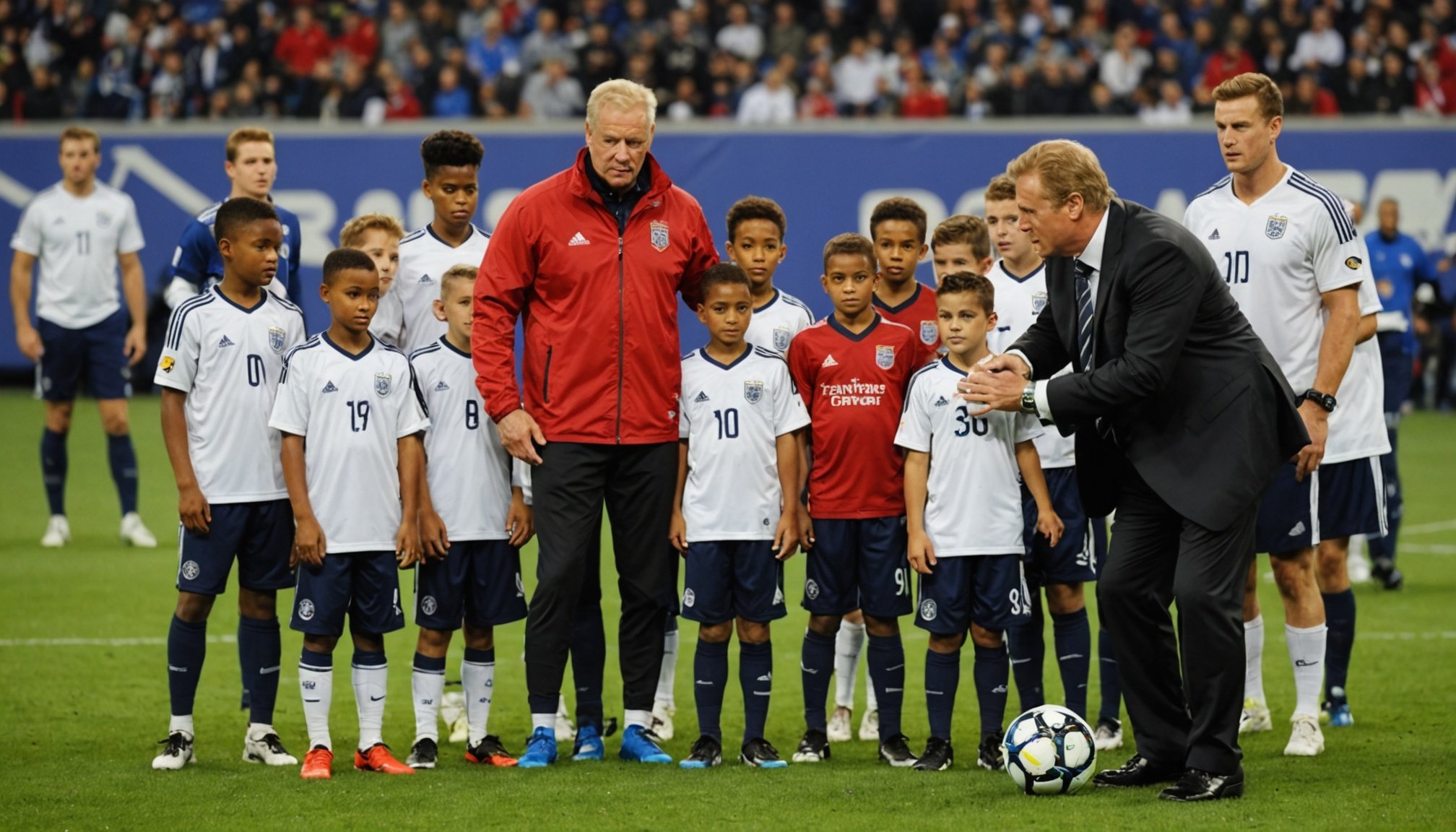Understanding Leadership Traits in Young Athletes
When discussing leadership qualities in youth sports, it is crucial to recognize the characteristics that define effective leadership. In football, these traits often include resilience, communication skills, and the ability to motivate teammates. Young athletes with these qualities can lead by example, encouraging their peers to perform at their best.
Importance of Recognizing Potential Leaders Early
Identifying leadership traits early in a youth athlete’s development is beneficial not just for the individual but for the entire team. Early recognition can lead to tailored mentorship and training, which enhance a player’s natural abilities.
This might interest you : Enhancing football match days: unlocking fan insights for unforgettable club experiences
Behavioral Indicators of Leadership in Practice Settings
Leadership isn’t just about what happens on game day; practice sessions are a pivotal setting to observe these traits. Behavioral indicators, such as a youth athlete’s enthusiasm during drills, their proactiveness in addressing team challenges, and their capability to stay positive under stress, are telltale signs of potential leaders.
In conclusion, fostering leadership qualities in youth sports opens numerous development opportunities. By identifying these traits early and nurturing them thoughtfully, the groundwork for a future leader in any sport is solidified. Engaging young athletes in this process fosters their growth on and off the field.
Additional reading : Revitalizing player involvement: cutting-edge techniques for football coaches to craft engaging training experiences
Proven Assessment Techniques
In the realm of talent identification in football, evaluating young talent effectively demands well-structured and diverse approaches. Coaches adopt assessment methods tailored to uncover potential and gauge skill levels accurately. Observation during practices, skills assessment games, and peer feedback play pivotal roles in this process.
Observation during Practices
Observation during practices offers a comprehensive view of a player’s abilities. Coaches meticulously analyze players’ positions, work ethic, and interaction with teammates. This method is key for assessing how young talent adapts to evolving game situations. By observing consistently, coaches can better understand decision-making processes and areas for improvement.
Skills Assessment Games
Skills assessment games simulate real-match scenarios, providing insight into a player’s technical proficiency and response to pressure. While exhibiting dribbling, passing, and shooting skills, these games also highlight adaptability and strategic thinking. Implementing systematic scouting during training ensures a varied perspective on each player.
Feedback from Peers and Coaches
Feedback mechanisms involving both peers and coaches are instrumental in providing a balanced evaluation. Encouraging peer feedback empowers players to identify communication strengths and weaknesses. Coaches’ insights further refine developmental targets, strengthening decision-making capabilities. Together, these feedback loops foster an environment where young athletes can grow consciously and confidently.
Training Approaches to Foster Leadership
Incorporating leadership training in sports is essential for nurturing future leaders both on and off the field. Football, in particular, provides a unique environment where individuals can develop as leaders through carefully designed coaching techniques for youth. Implementing leadership drills into regular training sessions is a practical method to instill these skills. These drills focus not only on traditional technical and tactical development but also on decision-making, communication, and team dynamics—key components of effective leadership.
Simulations and real-game scenarios play a crucial role in leadership skill development for football leaders. By creating challenging situations that mimic actual game conditions, coaches can encourage athletes to think critically and adapt. This approach not only enhances their problem-solving abilities but also gives them the confidence to lead under pressure.
Furthermore, establishing mentorship programs is a powerful method of fostering leadership. Pairing experienced players with younger athletes allows for the transfer of valuable insights and real-world experiences. This direct interaction helps youth understand the nuances of leadership, including emotional intelligence, resilience, and strategic thinking.
By intertwining these strategies, we strengthen the foundation of leadership training in sports, preparing athletes to excel as future sports leaders.
Encouraging Leadership Off the Field
While athletic skills are honed in practice and competitions, off-field development plays a crucial role in shaping well-rounded individuals. Youth athletes can benefit significantly from participation in youth leadership programs, which focus on building character in athletes through various structured activities.
Community Engagement Activities
Engaging in community projects allows young athletes to understand the importance of giving back. Such initiatives foster a sense of responsibility and empathy, reflecting leadership qualities beyond the sports environment. Youth leadership programs often incorporate tasks that require teamwork and problem-solving, enriching athletes’ character development.
Developing Communication Skills
Effective communication is pivotal not just in sports but in life. Training in public speaking helps athletes articulate their thoughts clearly and confidently. Additionally, learning to navigate team dynamics is essential. Workshops in youth leadership programs ensure that young athletes improve their communication skills, fostering better group interactions and collaborations.
Conflict Resolution Workshops
Understanding conflict resolution is integral to maintaining harmony in any setting. Workshops designed for young athletes teach various strategies to resolve disputes amicably. Participants learn techniques to handle disagreements, develop patience, and build resilience. These tools are invaluable in sports and real-life scenarios, transforming athletes into competent leaders capable of managing challenges effectively.
Case Studies and Real-Life Examples
Exploring successful leadership development stories can inspire and guide both young athletes and coaches. Renowned coaches like John Wooden exemplify excellence with methodologies that focus on building character as much as skill. His approach to leadership development emphasised discipline, teamwork, and humility, leading his athletes to embrace these values both on and off the court.
Consider the journey of inspiring youth athletes like Mia Hamm, who transformed from a promising soccer talent into a legendary leader through tailored coaching. Her success story underscores the power of mentorship and targeted leadership training from experienced coaches who instil confidence and strategic thinking.
On the other hand, learning from failures in leadership development is equally crucial. One notable case is a youth sports program that focused excessively on winning, neglecting emotional and psychological support. This oversight resulted in burnout and decreased interest among players. The program eventually revised its strategies to incorporate well-rounded leadership training, recognising that fostering resilience and communication skills is essential for long-term success.
These coaching success cases highlight the importance of blending traditional techniques with personalised mentoring. Empowering young athletes through proven coaching methods can transform potential into tangible leadership skills that resonate throughout their personal and professional lives.
Expert Insights on Leadership in Sports
Exploring leadership development strategies in sports can provide profound insights into how young athletes evolve into effective leaders. Coaching insights play a critical role in shaping this development. Whether it’s the tactical genius of a head coach or the motivating influence of an assistant coach, expert opinions on youth coaching help to mould the mindset of athletes, preparing them for leadership both on and off the field.
Interviews with Successful Coaches
Discover coaching insights through detailed interviews with renowned coaches. These conversations reveal not only the strategies employed on the field but also the personal traits that make a coach impactful. Whether it’s fostering team cohesion or developing individual brilliance, expert opinions unveil what it truly means to lead effectively in sports.
Academic Research on Youth Leadership
Recent studies have highlighted the positive effects of structured leadership programs within sports contexts. Academic research uncovers pivotal aspects of leadership development strategies that cater specifically to youth. These insights are backed by data, showing how sports can be an ideal platform for nurturing future leaders.
Best Practices from Various Football Programs
Incorporating expert opinions on youth coaching, several football programs have adapted their training to focus on emotional intelligence, communication skills, and decision-making capabilities. Successful programs often emphasize a blend of competition and camaraderie, highlighting the best practices identified from various teams. Such approaches are not only effective but also essential in achieving holistic athlete development.
Conclusion and Further Resources
In the evolving world of coaching, staying ahead requires dedication to ongoing education. Coaches can benefit from resources like books, courses, and workshops, which offer fresh perspectives and techniques. These additional coaching resources are crucial for anyone serious about football leadership development.
Engaging in continuing education for coaches not only enhances your skill set but also helps in understanding nuanced strategies. For instance, reading specialized books can deepen your knowledge about game tactics, while online courses offer flexibility to learn at your own pace. Workshops provide hands-on experience, making complex football leadership development concepts more relatable.
Moreover, networking among coaches can be an invaluable tool. Participating in shared learning sessions fosters an environment of mutual growth and idea exchange. This not only improves your coaching practice but also builds a supportive community that you can rely on.
Consider these approaches to enhance your coaching journey:
- Explore recommended books and online platforms for coaching.
- Attend workshops and coaching clinics for additional coaching resources.
- Join networks and forums dedicated to continuing education for coaches.
By committing to these resources, coaches can ensure they are well-equipped to lead their teams with confidence and expertise.











